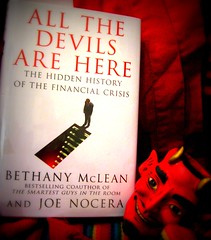Question by : My question is in two parts. What are Hedge funds and how did they contribute to the currect economic down tur?
The second question is how do subsdies from developed countries under cut developing countries,ie,Europe and Africa.
I am a lay man so please go easy on me a simple answers will do.I am not interested in Politicsssssssssssssssssss
Best answer:
Answer by financegal27
Ok I’ll try my best to answer these questions:
1. What is a hedge fund?
Hedge funds like mutual funds for high net worth and institutional investors. Hedge funds are Regulation D offerings under the SEC code, and as part of the Regulation D requirement they are not an investment that can be offered to all investors, cannot be marketed directly to the public, and to meet the SEC guidelines they can only be offered to accredited investors or qualified purchaser depending on if they are considered 3c-1 or 3c-7 funds. They are not subjected to the restrictions of the 40 Act.
An accredited investor is defined as:
1. a bank, insurance company, registered investment company, business development company, or small business investment company;
2. an employee benefit plan, within the meaning of the Employee Retirement Income Security Act, if a bank, insurance company, or registered investment adviser makes the investment decisions, or if the plan has total assets in excess of $ 5 million;
3. a charitable organization, corporation, or partnership with assets exceeding $ 5 million;
4. a director, executive officer, or general partner of the company selling the securities;
5. a business in which all the equity owners are accredited investors;
6. a natural person who has individual net worth, or joint net worth with the person’s spouse, that exceeds $ 1 million at the time of the purchase;
7. a natural person with income exceeding $ 200,000 in each of the two most recent years or joint income with a spouse exceeding $ 300,000 for those years and a reasonable expectation of the same income level in the current year; or
8. a trust with assets in excess of $ 5 million, not formed to acquire the securities offered, whose purchases a sophisticated person makes.
A hedge fund can use a variety of investment techniques that mutual funds cannot, they can hedge positions by shorting stocks, purchasing derivatives, swaps, leverage arbitrage, etc.. They are a complicated investment, that can be very risky and require sophisticated investment knowledge to make an educated decision as to what to invest in. Though, contrary to popular belief the majority of hedge funds are often less risky an investment than most mutual funds, the reason people have concerns with them is actually due to the operational differences and smaller nature of the firms that run them. The strategies can be complicated though and while the goal is to reduce risk understanding the strategies is really important because some strategies actually are quite flawed and/or expose you to risks that are different than traditional market risk which can result in significant losses.
2. How did hedge funds contribute to the current economic downturn?
They really didn’t, I’m not sure why they continued to get blamed for it. The current economic down turn was caused by a number of things, but mostly it was due to easy credit, the excessive use of leverage by investment banks, flaws in the securitization of mortgage securities, failure of the SEC and other regulatory authorities in the oversight of these organizations, failure of the rating agencies to properly evaluate the risks of securitized fixed income products. The hedge funds had nothing to do with it. They are investors who lost money as a result of this as well.
3. How do subsidies from developed countries under cut developing countries. Well this is really best addressed by simple economics, subsidies are a type of financial assistance provided by the government to help benefit a specific industry. The problem is it artificially warps the normal laws of supply and demand. In general its the subsidies that the emerging economies themselves provide that cause problems. For example, China has historically subsidized oil prices, meaning they set the price of oil at a rate to help facilitate the demand, using the government’s surplus to cover the difference. So let’s say China wants the price of oil to be $ 20 to make it affordable for the people, but oil costs $ 50, the government subsidizes the difference and the people’s demand reflects the $ 20 price, this means that demand would be much greater than price and supply warrants, pushing up the price of oil for everyone else, so everyone else suffers. Eventually so does the government providing the subsidy because their costs skyrocket and this leads to a major downturn in oil prices as the government adjusts or removes the subsidy, demand falls very suddenly and prices crash. In the mid 1900s the U.S. government subsidized the farmers in this country to ensure that they would be able to make an attractive profit and encourage them to keep harvesting as the cost of production was rising. However the subsidy artifically solved the problem, farmers ended up producing more than was demanded, prices fell and the subsidy no longer covered the short fall so many farms went out of business. This links below also covers this issue in depth:
http://www.businessbookmall.com/Economics_31_The_Economics_of_Government_Subsidies.htm
http://www.economicshelp.org/marketfailure/subsidy-positive-ext.html
Give your answer to this question below!








